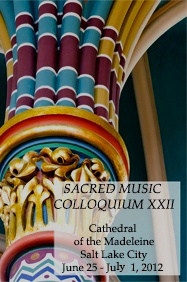Abandoning the traditional music and texts of the Mass was clearly not the intention of the Council, whose Constitution on the Sacred Liturgy, Sacrosanctum Concilium (1963), decreed that "the treasury of sacred music is to be preserved and fostered with great care" (SC 114). This principle was further clarified in 1969 by the Consilium (the group of bishops and experts set up by Pope Paul VI to implement the Constitution on the Liturgy), who responded to an inquiry on whether the permission for singing vernacular hymns at a low Mass — given in the instruction De musica sacra et sacra liturgia of September 3, 1958 — was still in effect. (Before the Council the hymns sung at low Mass did not replace the prescribed Mass texts, but were an addition to them, and were considered only an "indirect" form of participation.)
The Consilium's response was very clear:
That rule [permitting vernacular hymns] has been superseded. What must be sung is the Mass, its Ordinary and Proper, not "something", no matter how consistent, that is imposed on the Mass. Because the liturgical service is one, it has only one countenance, one motif, one voice, the voice of the Church. To continue to replace the texts of the Mass being celebrated with motets that are reverent and devout, yet out of keeping with the Mass of the day amounts to continuing an unacceptable ambiguity: it is to cheat the people. Liturgical song involves not mere melody, but words, text, thought and the sentiments that the poetry and music contain. Thus texts must be those of the Mass, not others, and singing means singing the Mass not just singing during Mass.
(Original emphasis. The response was published in Italian in the Consilium's official journal Notitiae 5 [1969] p. 406. An English translation appeared in the Bishops' Committee on the Liturgy's BCL Newsletter, August-September 1993.)
Intriguing! Quoted as recently as the BCL newsletter in 1993? wow. This seems to suggest that the postconcilar legislation on propers is actually STRONGER than preconciliar rules.
Jefferey Tucker
Subscribe to:
Post Comments (Atom)

No comments:
Post a Comment